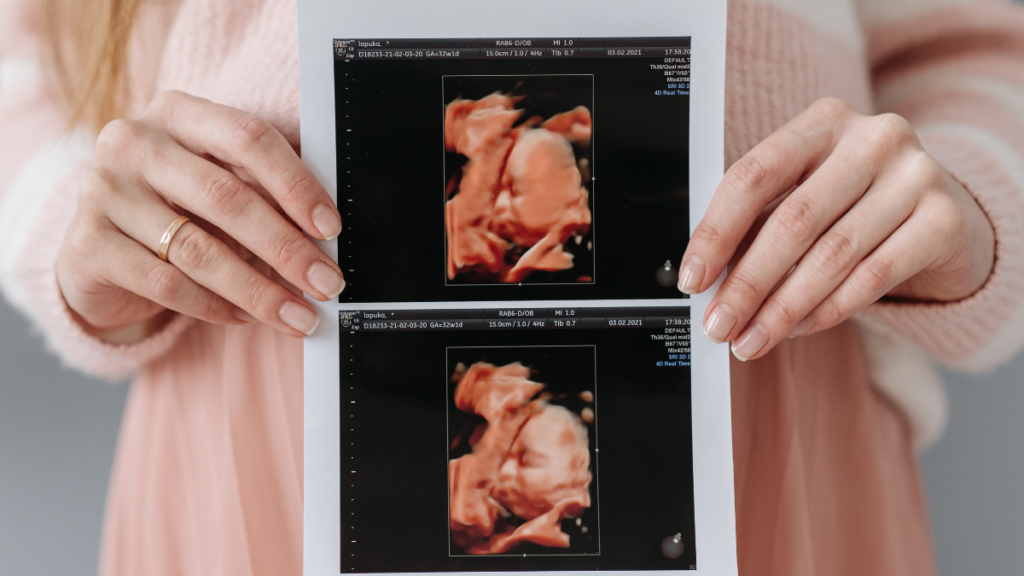
By ten weeks pregnant you may have already had your first midwife or doctor’s appointment or have your booking appointment coming up. At this stage, you’re approaching the end of your first trimester, and thankfully, may start to notice some of the pesky early pregnancy symptoms ease off.
However, as the morning sickness and tiredness begins to wear off, you might pick up on some new pregnancy symptoms and changes to your body. Read on to explore all the changes to your body and baby at ten weeks pregnant.
By week ten, your baby is growing and developing quickly. Now officially a fetus, your baby is around 30mm long and about the size of an apricot or a prune.
The head is growing at a faster rate than the body, and facial features are continuing to develop. Although the eyes are still half-closed, they are beginning to react to light. The jawbone is also starting to take shape and a tiny nose and ears are also forming.
Your baby’s heart is beating fast – at around 180bpm.
Although you are heading towards your second trimester, at ten weeks pregnant you may still be experiencing some early pregnancy symptoms.
At ten weeks some women might start to see the beginnings of a baby bump, but your clothes may also be feeling snug due to bloating. The increased progesterone levels cause the muscles in your womb to relax and expand. However, this also loosens the muscles in your digestive tract. This can lead to heartburn, bloating and wind.
Morning sickness is one of the most common pregnancy symptoms, although not everyone will suffer from it in their first trimester. Fortunately, most women notice the symptoms easing off as you head into the second trimester. However, this is not always the case.
Breast tenderness is another common symptom at this stage as the pregnancy hormone levels in your body continue to change.
As your uterus continues to expand, it can press on your bladder and result in what feels like endless trips to the toilet. The increased blood flow to your kidneys means you’ll produce more up to 25% more urine, too.
You may notice that you become much more sensitive to certain smells during the first trimester of your pregnancy. This, along with nausea, is a pretty hellish combination for some women during the first couple of months of pregnancy. Thankfully, symptoms tend to wear off as you progress through your second trimester.
From mid-way through your first trimester some early pregnancy cravings might start to kick in and you could find yourself hankering for the most bizarre food combinations.
The changing hormone levels can also lead to your experience a strange, metallic taste in your mouth during the first three months.
One benefit of your increasing hCG levels and hormone changes is great hair!
With fluctuating hormones, changes to your body and not to mention the fact you’re growing a whole new human in your belly, it’s no wonder you might feel exhausted during the first three months. At nine weeks, your body is also producing more blood for your baby. This causes your blood pressure and blood sugar levels to dip, leaving you feeling more tired than usual.
Spotting at ten weeks can be alarming, but for some women light bleeding in the early months is common and nothing to worry about. However, bleeding can also signal a miscarriage. If you have been experiencing cramps, and the bleeding is more than light spotting, you should contact your doctor, midwife or visit your nearest hospital.
During the first trimester, you might notice a milky white discharge from your vagina. This is normal and nothing to worry about.
This sounds a little scary, but it is just the name given to the darkening of areas of your skin or brown patches on your face. It means ‘mask of pregnancy’ and is very common among women in their first trimester.
As you approach your second semester you may start to notice some physical changes to your body. Your waits may be thickening, and a baby bump might be starting to develop. At this point in your pregnancy, your uterus has expanded to the size of an orange. However, the bloating and changing hormone levels may leave your feeling bigger – and uncomfortable in your pre-pregnancy clothes.
It’s time for a visit to your midwife or doctor. A ‘booking appointment’ usually takes place between 8 and 12 weeks, and it’s usually the first time you’ll meet with your doctor or midwife to discuss your pregnancy and birth plans.
You may also be ready for your dating scan. This will most likely take place between 10 and 14 weeks and is the first opportunity you’ll have to see your baby and hear the heartbeat with an ultrasound. It’s often when a provisional due date is given.
At ten weeks pregnant, your baby is starting to move around in jerky movements, which can also be picked up on the scan.
For more information on development and milestones at every stage of your pregnancy, head to our pregnancy week-by-week guide.

© 2023 All rights reserved Baby & Toddler - part of parent promotions